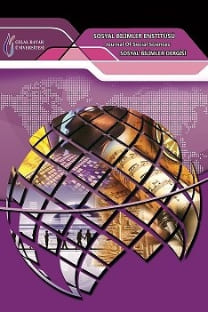İlkokul 4. Sınıf Ders Kitaplarındaki Soruların TIMSS 2019 Bilişsel Alanlarına Göre Analizi
Fen Öğretimi, bilişsel alanlar, TIMSS
An Analyze of the Questions in the 4th Grade Primary School Textbooks According to TIMSS 2019 Cognitive Domains
Science Teaching,
___
- Altunel, M. (2020). TIMSS 2019’da Türkiye. Seta / Perspektif, Aralık, Sayı 303.
- Atıcı, Samancı Ve Özel(2007). İlköğreti̇m Fen Bi̇lgi̇si̇ Ders Ki̇taplarinin Bi̇yoloji̇ Konulari Yönünden Eleşti̇rel Olarak İncelenmesi̇ Ve Öğretme. Türk Eğitim Bilimleri Dergisi Kış 2007, 5(1), 115-131.
- Centurino, V.A.S ve Jones, L. R. (2019). TIMSS 2019 Science Framework Chapter 2. TIMSS and PIRLS International Study Center, Lynch School of Education, Boston College and International Association for The Evaluation of Educational Achievement (Iea).
- Chiappetta, E. L.; Fillman, D. A. ve Sethna, G. H. (1991). A Method to Quantify Major of Scientific Literacy in Science Textbooks. Journal of Research in Science Teaching Cilt: 28, Sayı: 8, (713–725).
- Creswell, J. W. (2014). Araştırma deseni (nitel, nicel ve karma yöntem yaklaşımları). (S. B. Demir, Çev.) Ankara: Eğiten Kitap.
- Karamustafaoğlu, O., Yaman, S. & Karamustafaoğlu, S. (2005). İlköğretimde Fen ve Teknoloji Öğretimi, Anı yayıncılık, Ankara.
- Lind, K. K. (2005). Exploring Science in Early Childhood: A Development Approach. Thomson Delmar Learning, USA.
- Maskan, A. K., Maskan, M.H. Ve Atabay, K. (2007). İlköğretim 4. Sınıf Fen ve Teknoloji Ders Kitabının Değerlendirme Ölçütleri Yönünden İncelenmesi. Dicle Üniversitesi Ziya Gökalp Eğitim Fakültesi Dergisi. 9, 22-32.
- MEB. (2019). İlkokul fen bilimleri 4 ders kitabı. Ankara: Devlet Kitapları.
- MEB (2018). Fen Bilimleri Dersi Öğretim Programı (s. 8-9). Ankara.
- Mullis, I. V., & Martin, M. O. (2017). TIMSS 2019 assessment frameworks. TIMSS and PIRLS International Study Center. Chestnut Hill, MA: Lynch School of Education, Boston College.
- Neuendorf, K. A. (2002). The content analysis guidebook. Chicago: Sage Publications.
- Ocak, İ. Ve Doğan, B. (2018). Ortaokul 5-6-7 ve 8. Sınıf Öğrencilerinin Fen Öğrenmeye Yönelik Motivasyonlarının İncelenmesi. International Congress on Science and Education.
- Ozan, F. (2018). FeTeMM Etkinlikleriyle İşlenen Derslerin Etkililiği. International Congress on Science and Education.
- Özkan, İ. (2019). İlkokul fen bilimleri 4 ders kitabı. Ankara: Sdripekyolu Yayıncılık.
- Öztürk, L. (2010). TIMSS 2007 ve eğitim sistemimizin başarısı: öğretmen ve yönetici görüşleri. Yayınlanmamış Yüksek Lisans Tezi. Marmara Üniversitesi, İstanbul.
- Ina V. S. Mullis, Michael O. Martin, Pierre Foy, Dana L. Kelly ve Bethany Fishbein, TIMSS 2019 International Results in Mathematics and Science, (TIMSS & PIRLS International Study Center, Boston College: 2020).
- TIMSS 2019 Türkiye Ön Raporu, (MEB, Ankara: 2020).
- Yalın, H.İ. (2020). Öğretim Teknolojileri ve Materyal Geliştirme. 30. Baskı. Nobel Yayıncılık. Ankara.
- Yaman, S. Ve Orhan, A.T. (2018). Fen Bilimleri Dersi Öğretim Programlarının Karşılaştırılmalı Analizi. International Congress on Science and Education.
- Yapıcı, M. (2004). İlköğretim 1. Kademe Ders Kitaplarının Öğrenci Düzeyine Uygunluğu. AKÜ Sosyal Bilimler Dergisi. Cilt 6, Sayı 1.http://hdl.handle.net/11630/3301
- Yıldırım, A., & Şimşek, H. (2016). Sosyal bilimlerde nitel araştırma yöntemleri (10 b.). Ankara: Seçkin.
- ISSN: 1304-4796
- Yayın Aralığı: Yılda 4 Sayı
- Başlangıç: 2003
- Yayıncı: Manisa Celal Bayar Üniversitesi
Köprübaşı’nda Siyasi Hayat (1968-2004)
N11 Ülkelerinde Ekonomik Kompleksite ve Finansal Gelişme
COVID-19 (Koronavirüs) Pandemisinin Turizm Endeksleri Üzerindeki Etkisi: Bir Olay Çalışması
Sevinç GÜLER ÖZÇALIK, Binali Selman EREN
Kamu Sektöründe Beşeri ve Sosyal Sermayenin Çalışan Performansı Üzerindeki Etkisi
Şerafettin ERTEN, İbrahim TÜRKMEN
Nazire Burçin HAMUTOĞLU, Gözde SEZEN-GÜLTEKİN, Mübin KIYICI
Bauman’da Sosyal Eşitsizlik Meselesi
Sosyal Medyada İşveren Çekiciliği: Çalışan Kullanımı Üzerine Nitel Bir Analiz
Tolga ŞENTÜRK, Murat Can BAŞARAN
Bizans İmparatorluğu Döneminde Trabzon ve Çevresinin İdari Yapısı (VI-XI. Yüzyıl)
